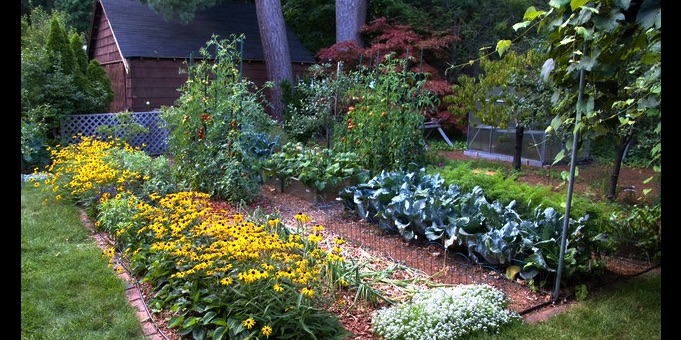Sam and Margaret Fogel of Halcyon Road in Newton are applying scientific standards to reduce their family’s carbon footprint. The Fogels professional careers included consulting on biological degradation of toxic chemicals in soil and groundwater. Now in retirement, they have turned their talents to front and backyard farming, solar arrays, heat exchangers, and improved insulation to reduce use of fossil fuels.
The Fogels’ quest for sustainable living dates back to the 60s when they first went to an MIT presentation on solar  panels. This was the time when the New Alchemy Institute on Cape Cod was developing passive solar fish farming among other innovations. Then five years ago, a presentation by Paul Eldrenkamp sponsored by Green Decade (now Green Newton), introduced them to blower doors as a way to evaluate home heat loss and to membership in Northeast Sustainable Energy Association (NESEA), which has helped guide them.
panels. This was the time when the New Alchemy Institute on Cape Cod was developing passive solar fish farming among other innovations. Then five years ago, a presentation by Paul Eldrenkamp sponsored by Green Decade (now Green Newton), introduced them to blower doors as a way to evaluate home heat loss and to membership in Northeast Sustainable Energy Association (NESEA), which has helped guide them.
Then, beginning two years ago, the Fogels took their first steps into solar energy. Told originally that they did not have enough roof space, they turned to Byggmeister to create a south-facing, shingled solar awning above the first floor to augment panels on their hip roof. Solar Flair provided  and installed the solar panels. “We have 11 panels on our south-facing roof, 6 on our east-facing roof and 9 on our new awning,” Margaret recounted.
and installed the solar panels. “We have 11 panels on our south-facing roof, 6 on our east-facing roof and 9 on our new awning,” Margaret recounted.
The Fogels have taken advantage of Mass Save and Federal rebates for improvements they have made. They purchased two ductless split heat pumps stationed outdoors from Next Step Living, and installed five indoor wall-mounted units that provide heating or cooling in separate rooms throughout the house. All through the magic of physics and temperature differentials, during the summer, heat pumps can extract heat from warm air inside the house and move it outside, and in winter, move heat from warm air outside and transfer it into the house, even in temperatures in the 30s or 40s or lower.
Another way the Fogels are trying to reduce their carbon footprint is with their extensive fruit and vegetable gardening. As detailed by Margaret, “The Fogel vegetable garden comprises about 100 feet of 3-foot wide beds, where we grow  spinach, lettuce, chard, kale, beans, cabbage, broccoli, brussels sprouts, tomatoes and onions.” Extensive fruit plantings “include pear, plum, cherry, peach, dwarf apples, a grape arbor, raspberries, and blueberry bushes. All are drip-irrigated.”
spinach, lettuce, chard, kale, beans, cabbage, broccoli, brussels sprouts, tomatoes and onions.” Extensive fruit plantings “include pear, plum, cherry, peach, dwarf apples, a grape arbor, raspberries, and blueberry bushes. All are drip-irrigated.”
“The dollar value of our yields, based on supermarket prices, probably does not cover expenses, which include our time,” confesses Margaret. “However, the process is rewarding in a broader sense. Gardening is our way of contributing to public understanding of what is involved in seeking sustainability for our future and that of our world’s children. Also our produce has a smaller carbon footprint than that trucked from the west coast.”
Next steps: They have installed a new high efficiency furnace to further reduce use of natural gas on very cold days. And too use their excess electricity and reduce use of petroleum, they will get an electric car. They plan to record and share data about their energy use as a way to educate others, Stay tuned for further developments.


Recently on Twitter